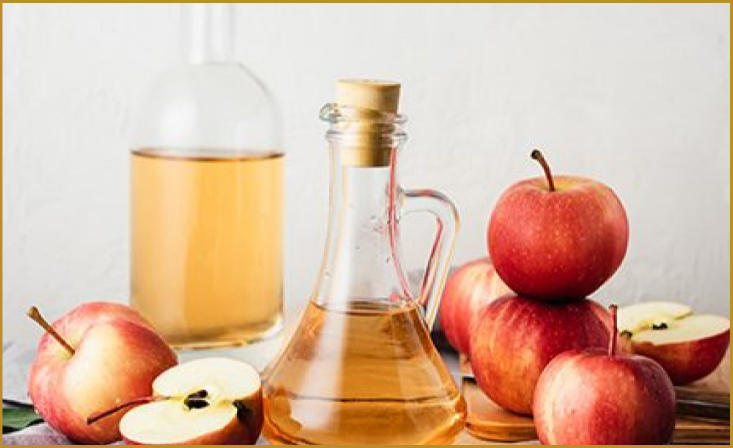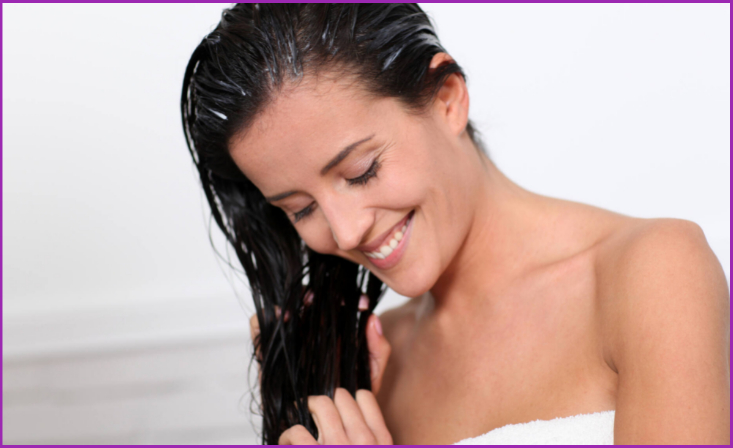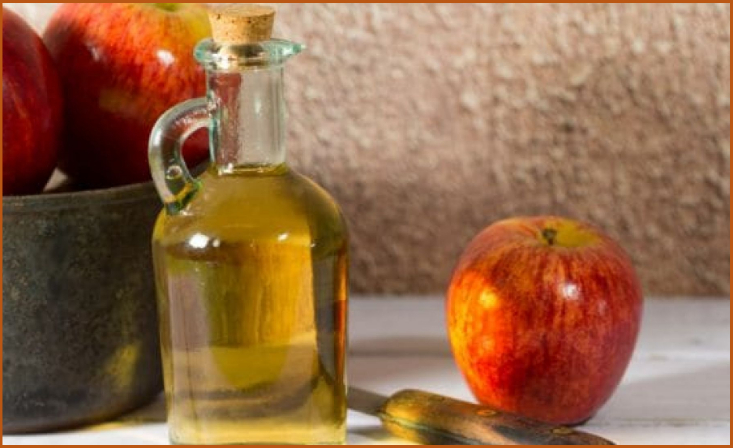Is Apple Cider Vinegar Good for Your Skin and Hair – Apple cider vinegar (ACV) has gained widespread popularity as a natural remedy for enhancing skin and hair health. This versatile elixir, derived from fermented apple juice, offers a range of potential benefits, from promoting skin radiance to maintaining lustrous hair. ACV’s natural acidity and unique composition make it a promising candidate for addressing various skincare and haircare concerns.
In this essay, we will explore the numerous advantages of incorporating apple cider vinegar into your skincare and haircare routines. From maintaining the optimal pH balance of your skin to treating conditions like acne and dandruff, ACV is a versatile and cost-effective option.
However, while its benefits are evident, it’s crucial to use ACV judiciously and with caution, as its potency can lead to adverse effects if not handled properly. This essay will also discuss the right ways to use ACV for skin and hair, potential risks, and precautions to ensure safe and effective results.
By the end, you will have a comprehensive understanding of whether apple cider vinegar is indeed good for your skin and hair.
Is Apple Cider Vinegar Good for Your Skin and Hair

Benefits of Apple Cider Vinegar for Skin
Apple cider vinegar (ACV) offers several potential benefits for the skin, making it a popular choice for natural skincare. Here are some of the key advantages:
- Balances Skin pH: ACV is naturally acidic, helping to balance the skin’s pH levels. Maintaining the right pH (around 5.5) is essential for healthy skin, as it can prevent over-drying or excessive oiliness.
- Acne and Blemish Control: ACV’s antimicrobial properties may help in fighting acne-causing bacteria. It can also reduce the appearance of blemishes and pimples when used as a toner or spot treatment.
- Hydration and Moisturization: ACV can improve skin texture and moisture retention. It’s a natural humectant, helping to lock in moisture and reduce dryness and flakiness.
- Exfoliation: The alpha hydroxyl acids (AHAs) in ACV act as a gentle exfoliant, aiding in the removal of dead skin cells. This promotes a smoother complexion and can be particularly beneficial for those with rough or dry skin.
- Treatment for Skin Conditions: ACV has been used to alleviate skin conditions like eczema and psoriasis. Its anti-inflammatory properties can help soothe irritated skin and reduce redness.
- Sunburn Relief: Diluted ACV can provide relief from sunburn. It can soothe the skin, reduce redness, and promote healing.
- Age Spot and Wrinkle Reduction: Some people use ACV to lighten age spots and reduce the appearance of fine lines and wrinkles. Its exfoliating properties can contribute to a more youthful-looking complexion.
- Antioxidant Protection: ACV is rich in antioxidants, which can help protect the skin from environmental damage caused by free radicals, potentially slowing down the aging process.
- Scar Fading: ACV may help in fading scars over time. Regular application can contribute to the lightening of scar tissue, improving skin appearance.
- Skin Tone Enhancement: Regular use of ACV as a toner can help improve overall skin tone, reducing redness and promoting a more even complexion.
Also, Read – Natural Beauty Products for Glowing Skin
Benefits of Apple Cider Vinegar for Hair

Apple cider vinegar (ACV) has gained popularity as a natural remedy for hair care due to its potential benefits. Here are some of the advantages of using ACV for your hair:
- Scalp Clarification: ACV can help remove product buildup, excess oils, and dead skin cells from the scalp. This clarifying effect promotes a healthier and cleaner scalp.
- Maintains pH Balance: Just like with the skin, ACV can help balance the pH of the scalp. An optimal pH level promotes healthier hair and a less hospitable environment for dandruff and other scalp issues.
- Natural Hair Conditioner: ACV can be used as a natural conditioner, leaving your hair feeling soft and smooth. It helps to close the hair cuticles, which can improve the texture and appearance of your hair.
- Enhanced Hair Luster: Regular use of ACV as a hair rinse can give your hair a healthy shine. It can improve the overall luster and manageability of your hair.
- Dandruff and Itch Relief: ACV’s antimicrobial properties can help combat dandruff and soothe an itchy scalp. It can also help reduce the formation of flaky skin on the scalp.
- Stimulates Hair Growth: Some people believe that ACV can stimulate hair follicles and promote hair growth. While more research is needed to confirm these claims, it may contribute to improved hair thickness and health.
- Reduces Frizz: ACV can help with hair frizz by sealing the cuticle and smoothing the hair shaft. This results in less frizz and improved hair manageability.
- Detangles Hair: Using ACV as a hair rinse can help detangle hair, making it easier to comb or brush, and reducing breakage.
- Prevents Hair Loss: Some proponents suggest that ACV can help prevent hair loss by strengthening hair and reducing hair breakage.
- Natural Shine Enhancer: ACV can enhance the natural shine of your hair, making it look healthier and more vibrant.
Also, Read – Best Anti-Aging Skincare Routine
How to Use Apple Cider Vinegar for Skin and Hair

Using apple cider vinegar (ACV) for skin and hair can be beneficial, but it’s crucial to do so carefully to avoid any potential side effects. Here are the recommended steps for using ACV for skin and hair:
For Skin:
- Dilution: Always dilute ACV with water before applying it to your skin. A common ratio is one part ACV to three parts water. You can adjust the ratio to suit your skin’s sensitivity.
- Patch Test: Before applying ACV to your face or body, do a patch test on a small area of skin to check for any adverse reactions. If you experience redness, burning, or irritation, discontinue use.
- Toner: As a toner, mix your diluted ACV in a spray bottle or a container. Apply the solution to a cotton ball or pad and gently swipe it across your face after cleansing. This can help balance your skin’s pH and combat acne.
- Face Masks: You can create face masks by mixing diluted ACV with other natural ingredients like honey, yogurt, or aloe vera. Apply the mask to your face, leave it on for 10-15 minutes, and rinse with warm water.
- Spot Treatment: For blemishes, dip a cotton swab into diluted ACV and apply it directly to the affected area. Leave it on for a short time, and then rinse with water.
- Rinse: After using ACV on your skin, it’s a good practice to rinse your face with water to remove any residual odor and acidity. Follow with your regular moisturizer.
For Hair:
- Dilution: Just like with the skin, ACV must be diluted before applying it to your hair. Mix one part ACV with three parts water. You can adjust the ratio based on your hair type and sensitivity.
- Shampoo and Conditioner: After shampooing your hair, use the diluted ACV as a final rinse. Pour it over your hair and scalp, massaging it in, and then rinse with water. You can also use a conditioner after the ACV rinse.
- Hair Masks: To condition and promote shine, mix ACV with other hair-nourishing ingredients such as honey, olive oil, or aloe vera. Apply the mixture to your hair and leave it on for 10-15 minutes before rinsing thoroughly.
- Scalp Treatment: To address scalp issues or dandruff, apply diluted ACV directly to the scalp with a spray bottle or cotton ball. Gently massage it into the scalp, leave it on for a few minutes, and then wash it out.
- Frequency: The frequency of using ACV on your hair varies from person to person. Some use it once a week, while others use it less frequently. It’s essential to find the right balance for your hair type and needs.
- Protect Your Eyes and Ears: Be cautious to avoid getting ACV in your eyes or ears, as it can cause irritation.
Conclusion
In conclusion, apple cider vinegar (ACV) holds promise as a natural remedy for skin and hair care. Its potential benefits include pH balance, hydration, and the treatment of various skin and hair issues. However, cautious and responsible use, including proper dilution, patch testing, and attention to individual reactions, is essential.
While ACV can be a valuable addition to your skincare and haircare routine, consulting with professionals for personalized advice remains important. When used mindfully, ACV can contribute to healthier skin and hair, enhancing your natural beauty.
FAQs
ACV is generally safe for most skin types when properly diluted. However, it can be too harsh for sensitive or very dry skin, so a patch test is recommended.
Yes, ACV’s antimicrobial properties can help in treating acne and reducing blemishes. It can be used as a toner or spot treatment.
ACV’s antimicrobial properties can combat dandruff and soothe an itchy scalp. Using it as a scalp treatment or rinse may be helpful.

